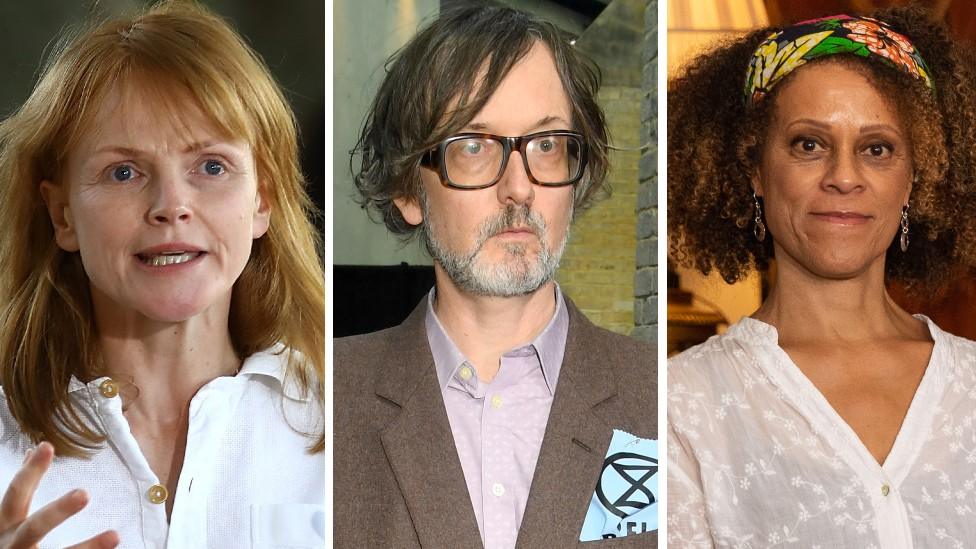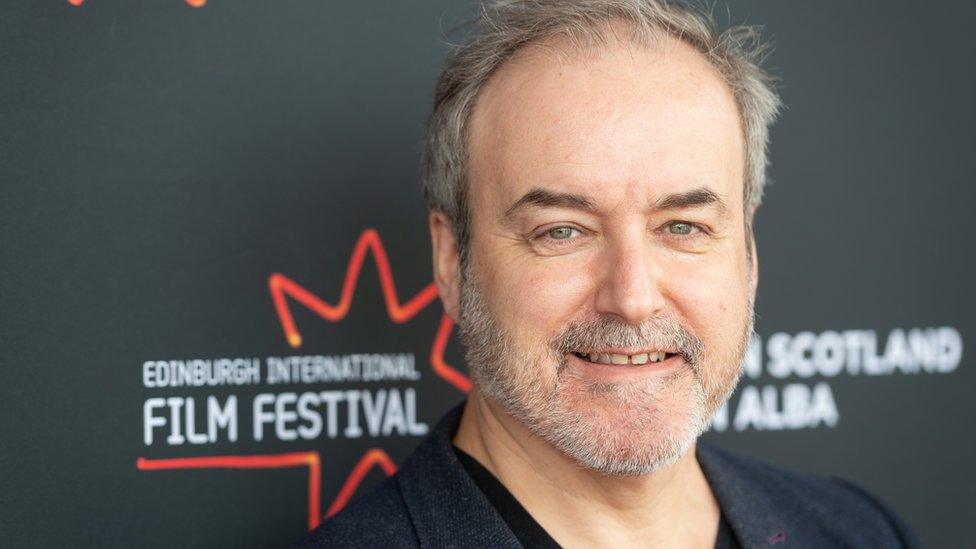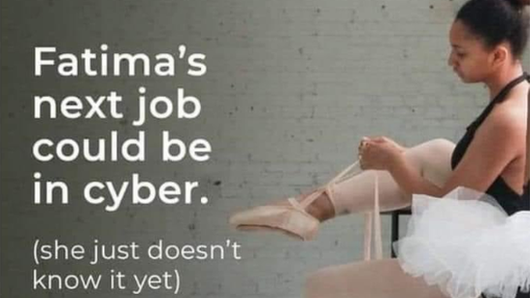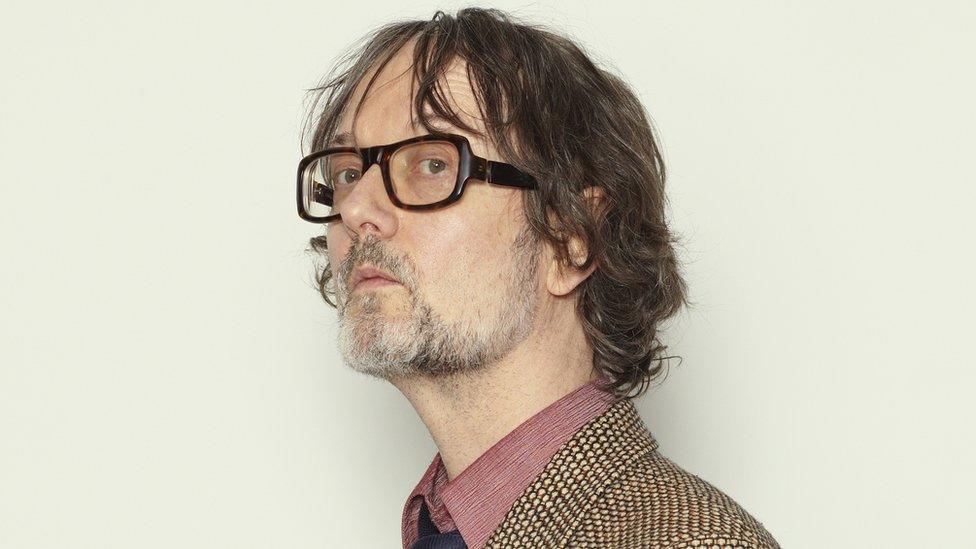Arts figures criticise plan to cut university funding for creative subjects
- Published

(Left to right) Maxine Peake, Jarvis Cocker and Bernardine Evaristo have lent their voices to a campaign
Singer Jarvis Cocker, actor Maxine Peake and author Bernardine Evaristo are among those to have criticised a plan to cut government funding for arts subjects at universities by almost 50%.
Arts courses are not among the official "strategic priorities", with a cut from £36m to £19m proposed next year.
The Department for Education said the reduction would only affect "a small proportion" of universities' income.
But Cocker argued the "astounding" move would hit poorer students hardest.
Peake, Evaristo and others have lent their support to a campaign launched by the Public Campaign for the Arts, which is urging Education Secretary Gavin Williamson to rethink his strategy.
'Build back better'
The government has said subjects like music, dance, drama and performing arts, art and design, media studies and archaeology are "not among its strategic priorities", according to the Office for Students, which distributes government funding to universities.
Mr Williamson said he would "potentially seek further reductions" to central funding for such courses in future years.
The government has asked for the money to be redirected to "subjects that support the NHS and wider healthcare policy, high-cost STEM [science, technology, engineering and mathematics] subjects and/or specific labour market needs".
That is needed to "support the skills this country needs to build back better", the Department for Education said.
'As if it's not important'
Former Pulp frontman Cocker, now a solo artist, told The Guardian, external the cuts would ensure arts subjects were only accessible to wealthier students.
"I think it will really just put off people from a certain background, and that's a pity because it's about mixing with people with different ideas, and then you get this cross pollination of stuff that makes things happen," he said.
"It always seems to be that it's art education that seems to be this expendable thing, as if it's not important, and it is."
Booker Prize-winning writer Evaristo described the plan, external as "catastrophic" and an "awful assault on the arts in universities".

David Arnold is a Grammy-winning film and TV composer
Grammy-winning British composer David Arnold, best known for scoring five James Bond films, noted how a raft of British talent had been recognised at last month's Oscars ceremony.
"This is on the world stage," Arnold told the BBC on Thursday. "Our artists, performers, creators consistently produce world class work and the benefit to our cultural and world standing is, to me, obvious.
"This is something we excel at, so why block the path? Denying so much talent the opportunity to learn, develop their craft and blossom."
He said he believed that investment in the arts pays off "in so many ways" - financially, socially and culturally.
"The bottom line is that this is a short sighted, tin-eared, mean-spirited idea made by people who cannot truly care about the cultural future of our country," he concluded.
Allow X content?
This article contains content provided by X. We ask for your permission before anything is loaded, as they may be using cookies and other technologies. You may want to read X’s cookie policy, external and privacy policy, external before accepting. To view this content choose ‘accept and continue’.
The Department for Education said most university funding comes from tuition fees and other sources, and that the changes to the "additional money" would "only affect a small proportion of the income of higher education providers".
The Strategic Priorities Grant makes up 3.4% of universities' total funding, a spokesman said. A separate £10m grant is being given to specialist education establishments, including "several top arts institutions".
A statement said: "High-quality provision in a range of subjects is critical for our workforce and our society...
"Our proposed reforms only affect the additional funding allocated towards some creative subjects, and are designed to target taxpayers' money towards the subjects which support the skills this country needs to build back better, such as those that support the NHS, high-cost STEM subjects."
'Blocks a route for working class and marginalised'
Chris Walters from the Musicians' Union said the consultation, which closes at midnight on Thursday, had been "poorly publicised" and was not "transparent", "legitimate" or "fair".
"It risks the financial viability of training that is essential for producing the next generation of musicians and arts professionals," he told the BBC.
"The notice for this cut is so short that it will likely cause chaos as courses are withdrawn at the last minute, affecting students who have already been accepted onto courses for autumn enrolment.
"The cut will affect all students, but particularly those from less privileged backgrounds who may rely on local, less well funded institutions that cannot divert funds from elsewhere."
Paul Fleming, general secretary of arts union Equity, said his organisation also "opposes these cuts in the strongest terms".
"This is yet another government attack on arts education, following years of deprioritising drama and other creative subjects in our schools," he said.
"What is most troubling about the proposal to cut 50% of funding... is that it blocks a route into the creative industries for working class and other marginalised groups."
The cultural sector contributed £34.6bn to the overall UK economy in 2019. That's an increase of 27% since 2010, compared with an 18% rise for the overall economy.

Follow us on Facebook, external, or on Twitter @BBCNewsEnts, external. If you have a story suggestion email entertainment.news@bbc.co.uk, external.
- Published12 October 2020

- Published4 July 2020

- Published3 March 2021
